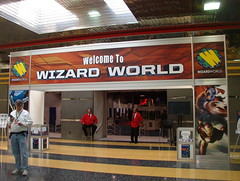Right now, the comics world is a-buzzin' with news about Wizard magazine closing its print edition and going digital. (And some of the fallout...well, to put it indelicately, it ain't pretty)
(This fact was, of course, initiallyforeseenby Mike Sterling, the greatest comics blogger of them all).
I'm going to be a little careful about this, since I'm involved with not one, but two competing interests. And admittedly, Wizard isn't disappearing...just moving into the 21st Century.
I haven't come to praise Wizard Magazine, but to bury it.
"But Gordon," you say to yourself, hoping I hear you, "Didn't Wizard Magazine help mobilize and popularize an art form that you love? Aren't you being a little hypocritical in trashing it, since it made it cool to like comics?'
Well....no. Because Wizard's emphasis on "cool" over "clever" is precisely the problem.
I'll grant you - yes, it came of age in the 1990s, when things were a bit overblown. I mean, you had Rob Liefeld doing jean commercials, Todd McFarlane purchasing baseballs, and...well, you get the idea. It became less about the medium and more about hyperbole.
If I want enthusiastic hyperbole, I'll take Stan Lee over Wizard any day.
Wizard enabled much of the loutish, rather obnoxious behavior that can be found in fan culture today: the inability to judge a work on its own merits, the sarcastic dismissal of differing opinions, and an overbearing sense of entitlement. Currently, Wizard seems less like an up-and-coming player and more like a desperately aging hipster, with more erratic guests (I mean, Blagojevich at last year's con? Really? What, was "Fast" Eddie Vrydoliak not available?), increasing competition from the digital realm, and - let's face it - an increasingly diverse range of fandom.
All in all, Wizard may not deserve the level of venom which I am flinging at it - many staff have done nothing to me personally, and are caught in a very awkward - and uncomfortable - situation. It's never good to take joy at another's misfortune...but in a way, Wizard's shifting digital shows at least one thing - they're seeing an opportunity for growth.
Hopefully, with an increasingly diverse channel providing a plethora of viewpoints and insights, Wizard's approach will seem....well, quaint. Lightly tinged with nostalgia, even.
But the best thing that could happen? Comics fans actually learn civility, critical thinking, and an appreciation for the art form.
Because Wizard....didn't do that.


1 comment:
Wizard was the perfect example of why I stopped collecting, that emphasis on faux cool over substance that seemed to overtake comics generally in the early 1990s
Post a Comment